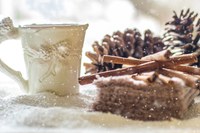Prairie Fare: Celebrate With Gifts That Promote Health
(Click an image below to view a high-resolution image that can be downloaded)
By Julie Garden-Robinson, Food and Nutrition Specialist
NDSU Extension
“What would you like for Christmas?” I asked my husband a few years ago.
“I just need new undershirts,” he replied.
He grabbed a package from the rack in a store and tossed them in the cart.
I wrapped them up and tied those cotton undershirts with a bow.
“Oh, look - undershirts!” he noted with exaggerated enthusiasm when opening the gift.
He didn’t win an Academy Award for acting. Granted, undershirts are comfortable and warm during cold winters. He received some new socks, too.
This year, after 10 months of a pandemic situation, the holidays probably will be different experiences for many of us.
I think my family is appreciating the value of simpler things. I know I am valuing health now more than ever.
Gifts are a way to show family and friends that we care about them.
What are some gift items that promote health and communicate that we care about the recipient? Here are a few ideas that you can mail to your recipients in case you are not able to get together.
- If your gift recipient likes warm beverages, provide an assortment of coffees or teas. Tea in particular has health benefits, and coffee in moderation also has some benefits. Read the “Coffee Time” publication at https://tinyurl.com/NDSUExtCoffee. See “Beverage Mixes in a Jar” for more do-it-yourself mixes at https://tinyurl.com/NDSUBeverageMixes.
- Try making a soup mix to warm a wintry day. Information on food mixes in a jar is available at https://tinyurl.com/NDSUMixItUp. Along with Friendship Soup, the site features mixes for Homemade Cornbread, Cranberry-Oatmeal Cookies and Country Chili.
- Provide a food thermometer, new potholders, apron and a cookbook based on your recipient’s favorite foods.
Why a food thermometer? Research from the U.S. Department of Agriculture has shown that one in four burgers turns brown before reaching the safe internal temperature of 160 degrees. For safety, cook meat, fish, poultry and eggs to the recommended internal temperature.
Along with a food thermometer, tuck in a “Fight BAC” food safety brochure available at http://www.ag.ndsu.edu/food/ (Click on Food Safety to learn more).
- Add some culinary greenery to your home. Assemble a “grow your own culinary herbs” kit with flowerpots, seeds and soil. You can learn about a variety of culinary herbs at https://tinyurl.com/NDSUHarvesHerbs from a publication written by a former horticulturist and me.
- Assemble or refill a storm survival kit, especially if your gift recipient lives in the Midwest. Winter weather sometimes is unpredictable and can result in emergency situations. Assemble an emergency kit for travelers. If your friend or family member already has one, discreetly check the person’s supplies and assemble a kit with items the person needs.
Be sure that winter survival kits include a windshield scraper; battery-powered radio; batteries; flashlight; snack foods, such as nuts, dried fruit, jerky and trail mix; water-proof matches; and a can to melt snow for water. For a complete list of supplies and a guide to preparing for winter disasters, visit the Centers for Disease Control and Prevention website at https://tinyurl.com/CDCDisasterList.
- Assemble a “fun in the sun” gift because the sun and warm weather will return. Consider providing a bottle of SPF 30 sunscreen, stylish shades and a floppy hat with a wraparound brim.
I guess that was more than a few ideas. Here’s one more idea: a recipe from North Carolina Extension, which can be packaged into plastic or glass containers.
Chai Tea Mix
1 c. nonfat dry milk powder
1 c. powdered nondairy creamer
1 c. French vanilla-flavored powdered nondairy creamer
1 1/2 c. sugar
1 1/2 c. unsweetened instant tea
2 tsp. ground ginger
2 tsp. ground cinnamon
1 tsp. ground cloves
1 tsp. ground cardamom
In a large bowl, combine first five ingredients. Stir in ginger, cinnamon, cloves and cardamom. In a blender or food processor, blend 1 cup at a time until the mixture is the consistency of fine powder.
To make tea, stir two heaping tablespoons of chai tea mixture into a mug of hot water. Makes about 48 servings. Each serving has 45 calories, 1 gram (g) fat, 9 g carbohydrate, 1 g protein and 10 milligrams sodium.
(Julie Garden-Robinson, Ph.D., R.D., L.R.D., is a North Dakota State University Extension food and nutrition specialist and professor in the Department of Health, Nutrition and Exercise Sciences. Follow her on Twitter @jgardenrobinson)
NDSU Agriculture Communication - Dec. 3, 2020
Source: Julie Garden-Robinson, 701-231-7187, julie.garden-robinson@ndsu.edu
Editor: Ellen Crawford, 701-231-5391, ellen.crawford@ndsu.edu




